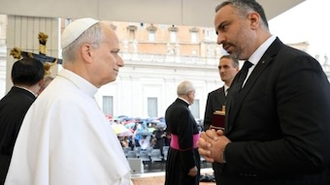Mayor of Bethlehem meets Pope Leo

Pope Leo speaks with Mayor Canawati from Bethlehem - Image Vatican Media
Source: Vatican Media
Bethlehem's recently appointed mayor, Maher Nicola Canawati, met Pope Leo XIV on Wednesday morning after the General Audience, expressing the concerns of his people and a plea for peace and hope in the Holy Land.
Mayor Canawati, who is a Christian, said the first letter he wrote when he became Mayor of Bethlehem in May was to the Pope, requesting a personal meeting. He said he believes the Church can help people in the Holy Land and most importantly, give them hope.
The mayor said emigration is draining Bethlehem and other Palestinian cities, draining the Holy Land of its Christian presence. "People have been leaving Bethlehem, leaving Palestine because of what's happening" he said, noting that settlements surrounding Bethlehem now rival the city's own population and put much pressure on resources.
The mayor said he explained to the Pope how important it was to intervene in what's happening in Palestine, in Gaza, in Bethlehem, in order to preserve the living stones of the Holy Land. "The Holy Land without the living stones is just a mere museum," he said.
Describing his meeting with the Holy Father, he said: "Always, before I talk about Bethlehem, I always pray. And that was my first sentence to the Pope: to intervene so we can stop this war, stop what's happening to our people in Gaza. And I think this is the top priority that we actually talked about, and he agreed."
The mayor painted a stark picture of life in Bethlehem today. The town has shrunk dramatically as the illegal settlements have taken over more and more Palestinian land. The Separation Wall isolates Bethlehem from its sister and its heart - Jerusalem - for the first time in history. "We're dealing with a lot of problems," he said.
Canawati said that by law, the mayor of Bethlehem must be Christian, a provision upheld by Palestinian leaders "because they want to preserve the Christian community, the oldest Christian community in the world that lives in Bethlehem, in the Holy Land, in Palestine."
Yet many are leaving. "The Palestinian Christians are now only 168,000 in the Holy Land, while there are over four million Palestinian Christians all over the world. That by itself shows how much pressure there is on the Christians."
"It breaks my heart for anybody to leave Bethlehem," he said, noting that in the past year alone, over 1,000 Christians got approval "for their immigration to Canada, the United States and other countries."
Bethlehem's economy, dependent on pilgrimage and hospitality, already suffered during the Covid lockdown. It has been devastated since 7 October 2023.
All 84 hotels in Bethlehem are totally closed. "The souvenir shops, the workshops that produce the beautiful olive woodwork, the mother of pearl and the jewellery that we produce in Bethlehem are closed. Totally closed," Canawati said.
He described soaring unemployment. "The unemployment rate jumped from 14 to 65% and as you know, people are denied access work within the Israeli areas."
More than 120,000 Bethlemites, he said, used to work outside the city, "some of them had loans, and now they don't have even to put bread on their table."
Water scarcity and restricted movement further exacerbates the situation, choking the people. Canawati explained that water is rationed as Palestinians in Bethlehem are not allowed to dig and take their own water: "We buy our water from the Israelis, and they only sell us one fifth of what a person would need per day."
"Some areas in Bethlehem don't get water for 50 days, 60 days," the mayor lamented. He added that there are now over 134 barriers and checkpoints - even inside the city - which hinder movement, depriving people not only of their freedom, but of the means to provide for their families and build a future.
Maher Canawati said the surge of solidarity that he has recently experienced in Italy and in other nations makes a tangible difference: "I think this gives more hope to the people, that there is someone caring about us, and they haven't forgotten about us."
He pointed to the support of the Latin Patriarchate and local clergy as "the best hope for now that we're getting in Bethlehem."
As for how the global community can help, he appealed for support to local organisations: "To support the people so they don't leave. And that is the most important thing that we're trying to do right now."
On Tuesday, Pope Leo briefly spoke with journalists about the situation in the Middle East. Asked about the recognition of the State of Palestine, the Holy Father said: "It could help, but right now there is no real willingness to listen on the part of the other side; dialogue is broken." He added: "The Holy See recognised the two-state solution some time ago. That is clear: we must seek a path that respects all peoples."
Concerning the situation in Gaza, he mentioned that he had spoken again with the Catholic parish there that afternoon. "Thank God, the parish is fine, although the incursions are getting closer and closer..."


















